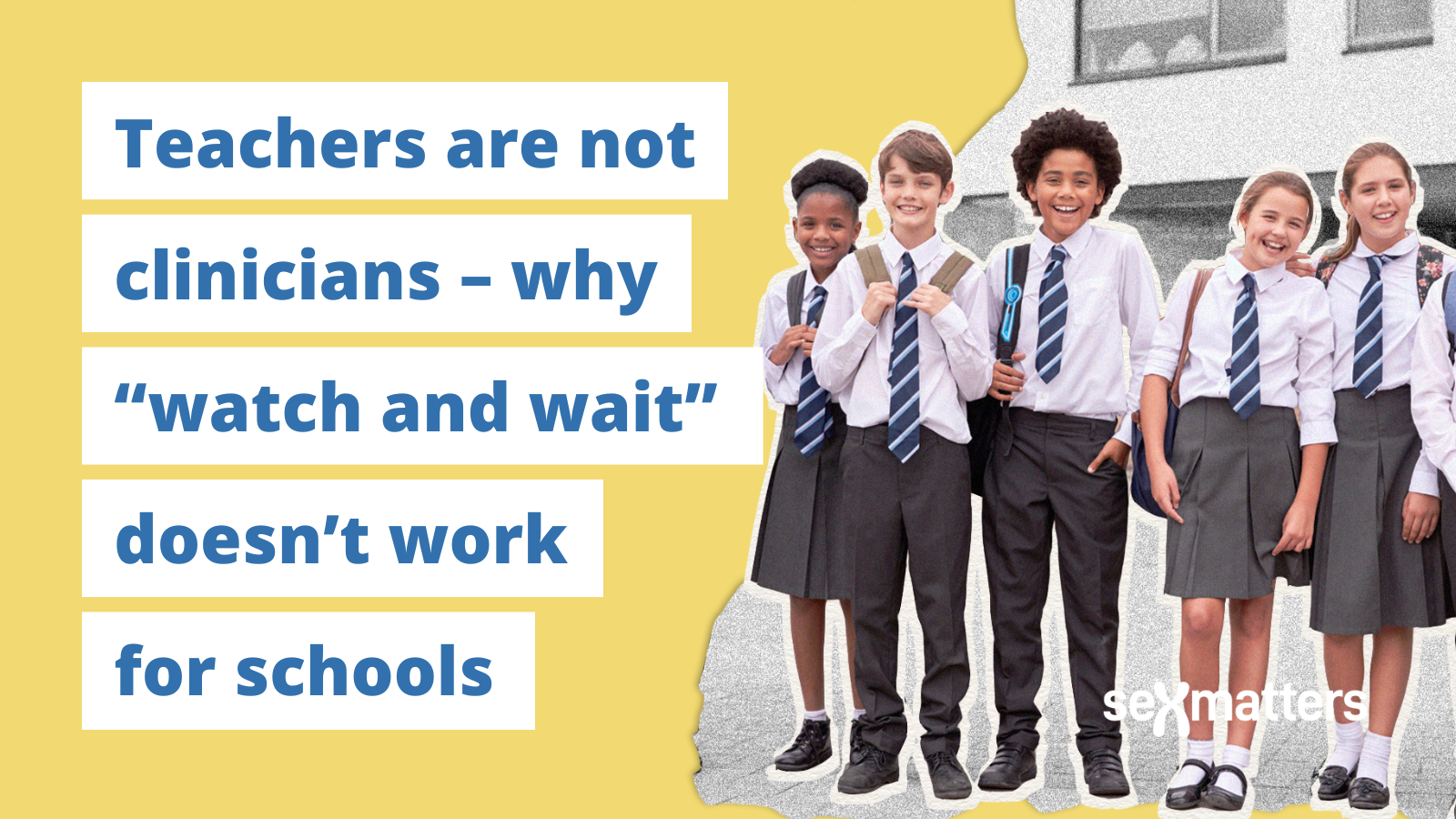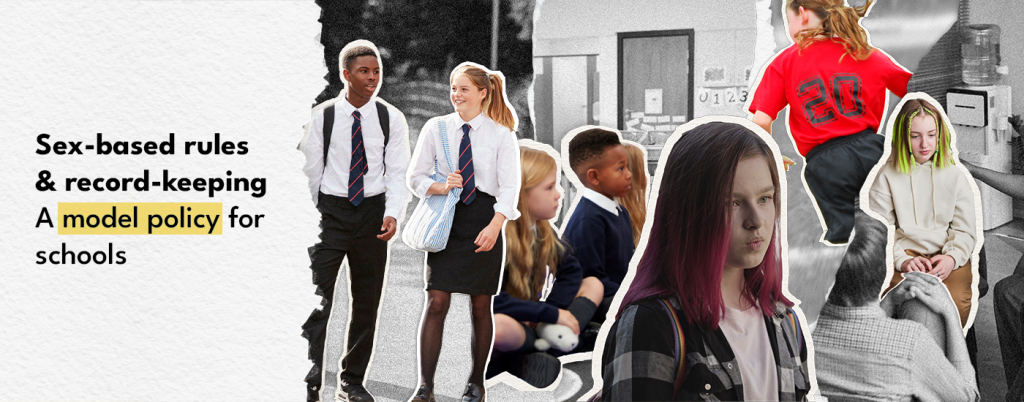Why schools need clear rules not “watch and wait”

Sex Matters has published a model policy for schools to help them to be clear about why they have sex-based rules and policies, and to respond lawfully and safely to children who are “gender questioning” and who want different rules to be applied to them. We are calling on the Department for Education to provide a similar clear policy document for schools to adopt.
Brighton & Hove Council has produced a draft Trans Inclusion Schools Toolkit (version 5, 2024). This blog post compares the two approaches.
Our approach is grounded in the recognition that being male or female is a material reality for all children, that sex-based in rules in school are not arbitrary. It is not possible for schools to keep girls and boys safe, or treat them fairly, while pretending that some of them have changed sex.
The model policy sets out underlying legal requirements on schools such as to:
- register each pupil’s sex and legal name, keep this information accurate, and pass it to their next school if they transfer
- provide single-sex facilities such as toilets, changing rooms and sleeping accommodation
- keep children safe, including considering risk factors in relation to their sex and the sex of others, and always recording information about risks accurately
- comply with the Equality Act, including (for a mixed school) providing equal opportunities for girls and boys and only separating them or applying different rules to girls and boys where this is justified
- have a behaviour policy (which would include provisions against sexual harassment).
The Brighton & Hove guidance considers the same legal framework, but it is based on the idea that people have an “internal sense of gendered self, for example whether a person feels they are a boy, girl, neither, both or without a gender at all” and that schools should facilitate allowing some children to live as the opposite sex (or both or neither).
Taking account of other children’s rights
Earlier this year a group of parents instructed Karon Monaghan KC to advise on the lawfulness of the previous (2021) version of the Brighton & Hove guidance. Monaghan said that the guidance did not explain the law and contained legal errors and misleading statements. She concluded that schools that follow the 2021 guidance would likely be acting unlawfully.
She broke down the recommendations on “social transition” and considered whether they were compatible with the Equality Act and the Human Rights Act, taking into account the rights of other pupils. She concluded that:
- guidance that a trans-identifying pupil has the right to choose to use single-sex facilities designated for use by pupils of the opposite sex is incorrect as a matter of law
- guidance to allow use of opposite-sex toilets is incorrect as a matter of law since school premises regulations require that communal toilet blocks for children over 8 are single-sex
- guidance allowing use of opposite-sex changing rooms is misleading in law since it takes no account of the possibility of indirect sex and religion and belief discrimination, harassment and breaches of human rights experienced by other children
- guidance allowing use of opposite-sex dormitories and bedrooms is misleading in law since it takes no account of the possibility of indirect sex and religion and belief discrimination, harassment and breaches of human rights experienced by other children
- guidance on competing in opposite-sex sport or having only mixed sport is misleading as it indicates that excluding children from opposite-sex sport competitions may be unlawful and does not take account of the likelihood that not having separate-sex sports will indirectly discriminate against girls
- guidance that trans-identifying pupils have the right to access opposite-sex lessons in RSE and PSHE is incorrect as a matter of law
- guidance on the safeguarding duty is inadequate, with the risk that schools will fail to properly discharge their safeguarding duty in respect of all children, including trans-identifying children.
Watchful waiting?
The Brighton & Hove guidance says that schools should take a “watch and wait” approach as defined by the Royal College of Psychiatrists:
“The College believes that a watch and wait policy, which does not place any pressure on children to live or behave in accordance with their sex assigned at birth or to move rapidly to gender transition, may be an appropriate course of action when young people first present.”
This sounds like a compassionate compromise. Similarly, the DfE draft guidance says:
“Allow for watchful waiting: Wait for a period of time before considering a request, to ensure it is a sustained and properly thought through decision. This period of ‘watchful waiting’ may help to ensure unnecessary action is not undertaken.”
But doctors are not considering the rights and interests of other pupils at school, or how schools operate as rules-based institutions. “Watchful waiting” is a clinical approach which is not workable for schools. As the Association of School and College Leaders said in response to the DfE draft guidance:
“Our members are not clinical experts, and should not be expected to possess or exercise clinical expertise.”
The legal analysis as set out by Karon Monaghan KC does not offer the possibility that after a period of waiting the answers about the balance of rights might be different. In fact, in practical terms the discomfort and loss of privacy and dignity for the other pupils will become more intense as pupils get older and go through puberty. It is not lawful for a school to allow a nine-year-old boy to use the girls’ toilet, and it will not become lawful when he is 12, 13 or 16.
It is certainly true that schools should not “place any pressure on children to live or behave in accordance with their sex assigned at birth” if that means pressuring girls to look pretty, act demure and study home economics while boys are expected to be macho, boisterous and better at maths and science.
But schools do place pressure (by means of expectations and disciplinary sanctions) on children to behave according to rules and routines. Some of these rules and routines (such as no boys in the girls’ toilets) are sex-based. The answer about whether some children can be allowed to break these rules (or in practice change category) is “no”, and this answer does not change with waiting.

